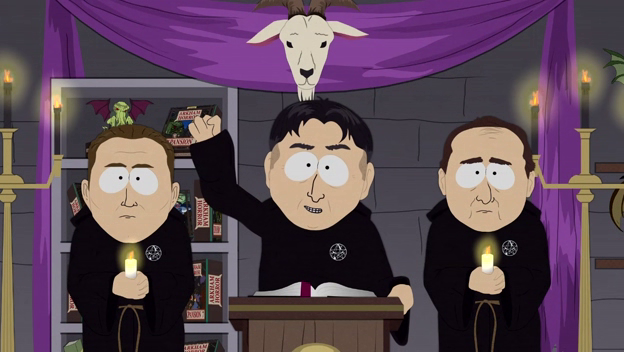Even though I’m probably best known for megadungeons, the style of play I personally prefer is the sandbox. The thing is, the sandbox, while it seems on the outside to be relatively simple (throw a lot of random stuff together, and let the PCs have at it), it’s actually one of the most difficult things to pull off properly.
Yes, this post is inspired by RPGPundit’s review of Isle of the Unknown.
Properly done, a sandbox campaign can be the most satisfying of all modes of play. It gives the PCs complete agency over what they do, where they go, and how they choose to interact with the environment. So, many GMs assume that the key to designing a sandbox is to present the PCs with a region (or an island, or a city, or something else that is geographically bounded in some way) that is stuffed with interesting things, and then shove them out the castle door and let them find things and have a wonderful time in the process.
This is a completely incorrect view of a properly constructed sandbox.
The first point that is missed is that all too often, one thinks that a sandbox means there is no plot. In fact, a lot of folks point to the sandbox as the “anti-railroad” and come to precisely this conclusion. This is perhaps the number one misconception about the RPG sandbox concept. There is indeed a plot. In fact, that’s one of the hallmarks of a well-done sandbox; there are many plots, all happening simultaneously. In fact, one of the best uses of plot in a sandbox campaign is to have several of them interact with one another on some level.
Having a bunch of stuff randomly strewn around without any sort of rhyme or reason doesn’t make for a good sandbox campaign. Perhaps a good funhouse campaign (and even my own Castle of the Mad Archmage has plots and factions and such that the PCs can interact with in a meaningful manner, and NPCs from whom they can gather valuable information about the dungeon, if they choose to do so), but “every hex is a new weird experience” isn’t a sandbox. It’s a funhouse. And after a while it doesn’t get fun, because there’s absolutely no way to predict what the next weird experience is going to be.
Now, before you go all “plot means railroad!!” on me, consider that the mere fact that plots (both in the sense of conspiracies and the sense of pre-planned stories) exist in a campaign does not compel the PCs to follow any of them. Which brings us to the second point…
Player agency cannot exist in a sandbox where the players are making blind choices.
Take, for instance, an island where each hex has a unique monster or some weird magical artifact. Nothing is tied to anything else, and the PCs are blundering from hex to hex and fighting monsters that rear their heads from the foliage, are fought, and then the PCs move on to the next hex. They might stumble on a dungeon, or a group of bandits, or something, but they are essentially flying blind with no idea of what’s out there.
In such a case, how can it matter, from the perspective of the PCs, whether they go north or east? They have no idea (and, more to the point, there is no way for them to have any idea) what the difference between going north and going east might be, so they flip a coin. That is not giving the PCs any sort of agency, and that is ultimately not a satisfying experience.
Now, however, imagine exactly the same island, but one where there are two competing cults of which the cleric is aware (in vague terms, possibly knowing their symbols and a snippet about each). The ranger’s mentor has told him of a ruined keep on the shores of a lake to the north, and the thief, as a member of the local Guild, knows about a group of bandits to the east that recently raided a caravan and captured a load of spices.
Now the party can at least make an informed decision about whether to go north or east, or to strike out to the west and see what they stumble across. If they happen to stumble across a shrine belonging to one of the cults, the cleric can chime in and possibly add some context; all the better if in that shrine they read a cryptic prophecy that points in the general direction of an abandoned mine to the northwest. And if they capture some of the bandits, they find that one of them has a tattoo marking them as a member of the other cult, and when pressed, he tells them about a secret meeting to take place three nights’ hence at a bluff overlooking the river. And so forth.
So, rather than just having a bunch of random, unconnected encounters, the tapestry of the sandbox now has at least three different strings that the PCs can tug on. Two of those strings, it turns out, are connected. If properly set up, there will be other strings out there, waiting to be discovered. Will the PCs start following the string that leads them to the mines, or will they choose to follow the one that leads them to the castle? And what happens if they choose one or the other? Perhaps in a month, if the cultist meeting is allowed to go forth unmolested, a greater threat will arise in the PCs base town. Which then turns into another plot string that they may, or may not, choose to tug on.
The point is that a properly constructed sandbox gives the PCs informed choices. There could be a dozen plot threads that they could choose to follow, or not, as fits their whim. Those choices should have consequences; if they ignore the fact that Hastur is going to be summoned When the Stars Are Right, they should at least have some chance to figure out that’s what they’re doing. “Oops! You didn’t go north, so the Old One has destroyed the town. Tough luck!” is exactly what should not happen.
That’s why sandboxes are so very difficult to construct. It’s actually much easier to design a railroad adventure. The PCs go from place A to place B to place C, and their actions and the broad outlines of the consequences are known. But a sandbox is a three-dimensional grid with a myriad of options. In order for the PCs to make sense of those options, they have to be given the information necessary to make a decision that is anything more than just a random flip of a coin.














Yup! I like the term "Player-driven campaign," and if the players are going to drive, they've gotta be able to plot their course.
What do you think about The Lord of the Rings movie trilogy as an example of a meaningful sandbox? Is it a good analogy, or is that story a railroad through the wilderness? Or something else?
Hee. Hey, Scott Anderson. Google "DM of the Rings." It doesn't get really funny until they get to the second trilogy, though. 🙂
Is taking something like _Isle of the Unknown_, with its unconnected locations, and developing a network of plots from it a decent exercise?
I have a copy, and I'm trying to wrap my head around the sandbox building.
I think the question regarding Lord of the Rings is… disconnected. The story tells _what happened_, so there are no choices left to be made. What decisions there were have already been made by the time the observer enters.
However, looking at the story I can understand why it could look like a railroad if it were presented as an adventure. In many stories there are many places where the protagonists gave choices and even consider different alternatives. Lord of the Rings does not demonstrate this so much. At least not directly, there are councils offstage where such things may have happened.
And Joseph, I agree with your description of sandboxes. I've spent a fair bit of time this month on a series of blog posts demonstrating how I would construct such a sandbox.
Sandbox and railroad refer to player agency, thus they are difficult to apply to passive media like novels or movies. Even if we assume it was a campaign, it would be more "something else": a story-driven campaign. There simply is no other quest than to destroy the one ring, the whole plot relies on this one mission (thus, no sandbox).
Now, if you tried to recreate the book, it would end as railroad, because you would deny your players the chance to solve problems in other ways than the fellowship did. You could run a more open-ended campaign if you instead developed strategies for the involved NPC parties, and prepared consequences for different ways to overcome the obstacles on the way, but most books lack the necessary background for this approach.
Scott, if you were to give the players a ring of invisibility, then let them know it's actually The One Ring and there's only one way to destroy it…then sit back and just let them do whatever with it – try to take it to Mount Doom, try to use it themselves, bargain with Saruman to overthrow Sauron then aid his rule, give the ring to the first Black Rider they see then head for the hills, whatever – then it's a sandbox. If you force them to follow the plot of the book (or movie if you prefer), then it's a railroad.
Someplace I was once saw a statement to the effect of, "A sandbox is laying so many different sets of tracks the players don't see the railroad."
Good post.
A sandbox is, IMHO, the "anti-railroad", but not because it lacks plot…but because it lacks rails.
I also think that there is a difference between using the word "plot" as "things that are happening/events that are occurring/schemes of NPCs and monsters" and using "plot" as "what the PCs will be doing in this arc".
In this sense, a game in Middle Earth during the War of the Ring could be a sandbox, but replaying the events of LotR is not.
Brett Slocum asked, "Is taking something like _Isle of the Unknown_, with its unconnected locations, and developing a network of plots from it a decent exercise?"
Yes. That's what it is designed for, and that's how it was originally done. If you take a look at the 1977 Wilderlands of High Fantasy (by Bob Bledsaw of Judges Guild), you will note that it is even sketchier than is my Isle of the Unknown! I actually made some concessions to more modern tastes by not making Isle even more terse. 🙂
I'm not too proud to admit that this post may as well have been written for my edification. I hope to use this knowledge at some point.
Great post, Joe. I agree with the sentiment that a true sandbox is all about THE HOOKS, as in plot hooks. I think that there's such a thing as "OSR extremism," which causes people to shout out terms and concepts until they become lost in translation. "Sandbox, sandbox!" they cry, but forget to expound upon what they mean by the term. It's taken too much for granted that the audience is "in the know" when it comes to the terminology/jargon. Your post served to provide some much-needed deepening of the definition.
Throughout my entire gaming career, including long before the term "sandbox" was invented, I was always creating plot hooks…many many many of them to lay before the players. Were there times when I, in my folly, threw a beloved scenario in the path of players no matter what they did? Of course! But most of the time I would let the "story" of the game unfold as the players saw fit, based on which threads they chose to tug. The true "story game" is what unfolds with each session, not some predetermined story/amateur novel written ahead of time and foisted upon the players.
We all know what I've discussed above. We all know that nuance. But it seems the blogosphere has a short memory, and we rehash this war of the sandbox vs. the railroad, and forget the subtle truth beneath the sparring. I'm personally getting tired of it. We all know what we're talking about. We just need to stop thinking other gamers are idiots!
The development of a specialized jargon can be a bane to the subject matter, if one starts to fetishize the words and use them as a dividing factor between those in the "club" and those on the outside.
As for RPG Pundit, I think he missed the point entirely: a product like Isle of the Uknown is not meant to fill in all the details, or make the connections between the hexes, or give a cohesive structure to what is going on on the island. That's the GMs job. Every GM that runs the Isle creates a different and unique Isle.
Great post, but I will chime in here that Isle of the Unknown is actually a very, very good sandbox module for GMs who want to create their own conenctions, plots and links with a fresh, creative angle. Is it weird and sometimes incoherent? Only if you're not trying. I rarely ever run published modules because the author intention is never quite in alignment with what I want. But an array of interesting take-it-or-leave-it content like Isle of the Unknown allows me to string together the weirdness in a manner that I find most interesting, or for that matter that my players will find interesting. So….good article, but I side with Anthony on this that just because a sandbox module doesn't spell it out for us doesn't mean it's not there, waiting to manifest in the emergent gameplay of actual use.
Bear in mind I wasn't talking about "Isle of the Unknown" specifically. I was speaking in general terms. My post was merely inspired by RPGPundit's review.
"A sandbox is, IMHO, the "anti-railroad", but not because it lacks plot…but because it lacks rails." I agree entirely. There is nothing wrong with a random campaign, and fun can be had. But a proper sandbox, which I could no way find the time to run now, would have dozens of concurrent plots and the players' can follow some or none of them.
Very good post.
Are there any commercial products that have a quantity of good interconnected plots? Creating random encounters in a hex I find is relatively easy. Developing interesting simultaneous plots interconnected and not-connected to be more difficult.
Thanks.
@Michael Fuller
The only one I know is Frog God Game's Razor Coast. Now it has it's problems, as a ground backing multiplot super module would, but it is excellent. Read EZG's review here: http://rpgaggression.blogspot.co.nz/2014/04/ezg-reviews-razor-coast.html
EZG is a prolific and respected reviewer of 3PP PF products and I find him very good.
Now this is based on the Pathfinder version, but it is available in Swords & Wizardry so that works with OS games.
It might not be everyone's cup of tea colonial/pacific island/cthulhu/mix. And the plots are maybe a bit tighter than the sandbox as described by Joseph. But it is a brilliant product, ground breaking, and uses some clever ideas to leave all these plots/hooks for the PCs to ignore or not. As I said the organisation is not quite perfect, it is first of it's kind, but it is clever. I really can't wait til Lou Agresta produces his next one, although the main writer is Nic Logue, Lou is the force behind it. RC was put on pre-order years ago in 3E era, Nic took our money but (sadly) collapsed under the business side of it. I thought the money was gone. Lou rescued the game from nothing, working with FGG to create a kickstarter and an awesome product.
Anyway check it out:
http://froggodgames.com/razor-coast
MP
Scott,
Thanks I'll take a look.
Great explanation of the relation between player freedom or agency, on the one hand, and plot.